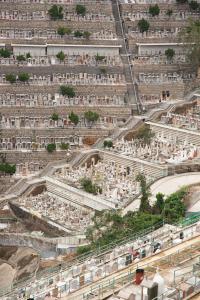I made the mistake of reading this fascinating twitter thread in the wee hours, after also trying to understand what the BillieEilishIsOverParty hashtag was all about. The internet is so strange—the bizarre mashup of millions of people’s thoughts and feelings scrolling by, a vast stream of would-be life. Meanwhile, the worldwide coronavirus ticker mounts and more of the map turns bright red. I am not the first person in human history to survey the landscape and think about death—the lections for this morning, wherever you might be reclining at the hour of worship, are all about it:
The hand of the Lord was upon me, and he brought me out in the Spirit of the Lord and set me down in the middle of the valley; it was full of bones.
Ezekiel is one of those unfortunate prophets to whom the Lord gave disturbing visions, those divine Instagram moments where the image, rather than being filtered and fit into the frame actually breaks through the internal, unquestioned filters we devise for ourselves. You don’t filter him, He filters you. In this case, the vision is stark and terrible, hashtag everyoneiscanceled, hashtag nohope:
And he led me around among them, and behold, there were very many on the surface of the valley, and behold, they were very dry. And he said to me, “Son of man, can these bones live?” And I answered, “O Lord God, you know.”
Or as I would have put it, “How should I know?” and also, “Why on earth have you brought me here?” This is not the sort of scene upon which I can bear to look. Since the day when photography was married to the wonders of the internet, even I have been confronted with snapshots of piles of dead people, however hard I try to avoid them. We have such a remarkable number of ways we can kill lots and lots of people very quickly, and then the journalist happens along and takes a quick snap before the mass grave is dug. But if that isn’t your kind of thing, you can listen on audible to accounts, as Matt is doing, of the plague, or read that helpful person who translates Thucydides for twitter.
It’s better when one person dies at a time. The body goes into the box and then into the ground and the family returns home and in a year, Facebook reminds you of your “Memories.” What’s totally ghastly is this picture of thousands of urns being delivered to a crematorium in Wuhan, where, as we all have been told so many times, there are no new cases of COVID-19. I can’t, therefore, imagine what all those are for. Hashtag Unbelievable.
Why would God ask Ezekiel if the bones could live? They can’t. It feels like an unfair question, if not actually cruel. Rather, we look at God and say, “Lord, if you had been here, my brother would not have died.” That’s the gospel reading for this morning, but I suppose I am getting ahead of myself. God wasn’t through with Ezekiel:
Then he said to me, “Prophesy over these bones, and say to them, O dry bones, hear the word of the Lord. Thus says the Lord God to these bones: Behold, I will cause breath to enter you, and you shall live. And I will lay sinews upon you, and will cause flesh to come upon you, and cover you with skin, and put breath in you, and you shall live, and you shall know that I am the Lord.”
Ezekiel, looking out over the pile of bones, was supposed to speak, to open his own mouth and tell all those bones to stand up and have the flesh come back, and all the parts of the body that make life possible. Like that old way of watching a movie where you stick the big clunky tape in the slot and then hold down the button and watch it go back until the beginning. Can you do that anymore? The only reason to, especially this morning, is if your internet is lagging because all the Christians in the world are trying to watch a Livestream. Ezekiel didn’t have the benefit of these technological triumphs and so he just had to do as he was told:
So I prophesied as I was commanded. And as I prophesied, there was a sound, and behold, a rattling, and the bones came together, bone to its bone. And I looked, and behold, there were sinews on them, and flesh had come upon them, and skin had covered them. But there was no breath in them. Then he said to me, “Prophesy to the breath; prophesy, son of man, and say to the breath, Thus says the Lord God: Come from the four winds, O breath, and breathe on these slain, that they may live.” So I prophesied as he commanded me, and the breath came into them, and they lived and stood on their feet, an exceedingly great army.
The scrolling stream of internet humanity shudders gently—an exceedingly great army is not really what anyone wants right now. Didn’t some international UN person call for a cessation of all violence in this difficult time? I swear I saw it on twitter.
What’s so curious about this vision—aside from all the dead people standing up to live, and the part in the gospel where Lazarus and walks out of his grave—is how it takes place. In the one case, Ezekiel speaks because God tells him to, and as he does what God says, the breath comes back into the bodies of all the slain, lying there on the valley floor, and they live. And in the case of Lazarus, Jesus stands outside the tomb and opens his mouth and speaks, commanding him to come out, and he does. Hashtag IfNecessaryUseWords.
The reason to contemplate death, as the New York Times thought it would be helpful for us to do, isn’t for the sheer pleasure and wisdom of contemplating death. ‘We’re all gonna die’ is helpful as only half of the exercise. It may be fine for a hashtag, but it’s not fine as a way of coping with reality. Yes, we are all gonna die, and some of us are going to die comfortably at home, suitably mourned by family, friends, and Facebook who will keep hold of our facial recognition stats for eternity. And some of us will die as a statistic during coronavirus. And some of us will die in war. And some of us will die in obscurity. And some will die tragically and painfully. We are all going to die. And we can but stand, until it is our turn, by the side of the grave in helpless disbelief.
Observe that it was not Ezekiel who went to God and demanded that the valley of dry bones be brought to life again. No such demand can be made. There is no final rewind button that makes it so. We pray for life and health, but when it is snatched away, that’s that. All you have is a handful of Instagram filters, Facebook memories, and dust.
No, it is God who comes to Ezekiel and tells him to speak, and then later comes and speaks himself. God is the one who wants the bones to live, who mourns Lazarus and then raises him, who wants us to unhinge our jaws and speak—at such a time as this—because death is not actually the point, and contemplating it forever is futile and terrible.
No, life is the point. Living is the point. Living forever with a body and a soul is the point.
It is thus that we head into the final stretch before Palm Sunday and Holy Week, wherein God, so committed to life, spared nothing, not even himself, to put the breath back into the bones. Moreover, the means by which God transfers this life to the dead begins right this moment. Ezekiel is somewhere in his grave—though not forever—and we are each headed to ours, and so the command to speak is just as pressing as ever. No one has to die in that ultimate terrible sense, to lie forever on the valley floor as a pile of bones. The offer of life is there for all who want it, for all who can acknowledge the desperate helplessness of death and let God give life forevermore. It happens mysteriously by the very power of breath, of a mouth that opens up to speak the name of Jesus to anyone who is perishing. God uses that very proclamation to break open the dead human heart and make it alive again.
Can these bones live? Can you open your mouth? What a question. Of course you can, even on twitter and Facebook, which may be all you have right now. Hashtag JesusSaves. Hashtag LiveForever. Hashtag It’sAlmostEaster













